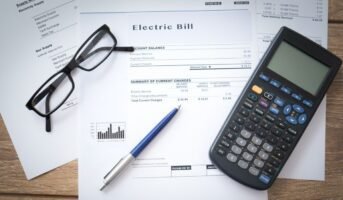For 2023-24, the Uttar Pradesh Electricity Regulatory Commission (UPERC) has notified the new rates for power consumption. The rate applicable to UPPCL’s distribution companies would also apply to consumers of Noida Power Corporation Limited (NPCL).
Categories of electricity connection in UP
In UP, electricity rates for consumers has broadly categorised on the basis of voltage level. These include:
- Low medium voltage (LMV)
- High voltage (HV)
Per unit UP electricity charge 2024
| Consumer category/ sub-category | Approved tariff for FY 2023-24 | |||
| LMV-1 | Domestic light, fan and power | |||
| Tariff excluding Subsidy | Subsidy and cross subsidy | Tariff payable | ||
| (a) | Consumers getting supply as per rural schedule : | |||
|
(1) |
Life line consumers: With contracted load of 1 kW, energy consumption up to 100
kWh per month |
|||
| Fixed charge | Rs 50 | – | Rs 50 | |
| Energy Charge ( 0-100
Units) |
Rs 6.50 | Rs 3.50 | Rs. 3 | |
| (2) | Other than life line consumers | |||
| (i) Unmetered | ||||
| Fixed charge | Rs. 935 | Rs 435 | Rs 500 | |
| (ii) Metered | ||||
| Fixed charge | Rs 90 | Rs 90 | ||
| Energy charge | ||||
| Up to 100 kWh per month | Rs 6.50 | Rs 3.15 | Rs. 3.35 | |
| 101-150 kWh per month | Rs 6.50 | Rs 2.65 | Rs 3.85 | |
| 151-300 kWh per month | Rs. 6.50 | Rs. 1.50 | Rs 5.00 | |
| Above 300 kWh per month | Rs 6.50 | Rs 1.00 | Rs 5.50 | |
| (b) | Supply at single point for bulk loads: 50kW and above, supplied at any voltage | |||
| Fixed charge | Rs 110 | Rs 110 | ||
| Energy charge | Rs 7.00 | Rs 7.00 | ||
| (c) | Other metered domestic consumers: | |||
|
(1) |
Life line consumers with contracted load of 1 kW, energy consumption up to 100
|
|||
| Fixed charge | Rs 50 | – | ||
| Energy charge ( 0-100 units) | Rs 6.50 | Rs. 3.50 | Rs 3 | |
| (2) | Other metered domestic consumers (for all loads) | |||
| Fixed charge | Rs 110 | – | Rs 110 | |
| Energy charge | ||||
| Upto 100 kWh / per month | Rs 6.50 | Rs 1.00 | Rs 5.50 | |
| 101-150 kWh / per month | Rs 6.50 | Rs 1.00 | Rs 5.50 | |
| 151-300 kWh per month | Rs 6.50 / kWh | Rs 0.50 | Rs 6 | |
| Above 300 kWh per month | Rs 6.50 | – | Rs 6.50 | |
| LMV-2 | Non-domestic light, fan and power | |||
| Tariff excluding subsidy | Cross subsidy | Tariff payable | ||
| (a) | Consumers getting supply as per rural schedule | |||
| Fixed charge | Rs 110 | – | Rs 110 | |
| Energy Charge | Rs 6.50 | Rs 1 | Rs 5.50 | |
| (b) | Other consumers | |||
| Fixed charge | ||||
| Load up to 4 kW | Rs 330 | |||
| Above 4 kW | Rs 450 | |||
| Energy charge | ||||
| Load up to 4 kW | ||||
| Up to 300 kWh per month | Rs 7.50 | |||
| Above 300 kWh per month | Rs 8.40 | |||
| Above 4 kW | ||||
| Up to 1000 kWh per month | Rs 7.50 | |||
| Above 1000 kWh per month | Rs 8.75 | |||
|
Minimum charge |
Rs 600
(Apr-Sep) Rs 475 (Oct-Mar) |
|||
| LMV-3 | Public lamps | |||
| (a) | Unmetered supply | |||
| Gram panchayat | Rs 2,100 kW or part thereof per month | |||
| Nagar Palika and Nagar Panchayat | Rs 3,200 kW or part thereof per month | |||
| Nagar Nigam | Rs 4,200 / kW or part thereof per month | |||
| (b) | Metered supply | |||
| Gram panchayat | Rs 200 | |||
| Nagar palika and nagar panchayat | Rs 250 | |||
| Nagar Nigam | Rs 250 | |||
| Energy charge | ||||
| Gram panchayat | Rs 7.50 | |||
| Nagar Palika and Nagar Panchayat | Rs 8.00 | |||
| Nagar Nigam | Rs 8.50 / kWh | |||
| LMV-4 | Light, fan, & power for public and private institutions: | ||||
| (A) | For public institutions | ||||
| Fixed charge | Rs 300 kW per month | ||||
| Energy Charge | Rs 8.25/kWh | ||||
| (B) | For private institutions | ||||
| Fixed charge | Rs 350 kW per month | ||||
| Energy Charge | Rs. 9.00 kWh | ||||
| LMV-5 | Small power for private tube well/ pumping sets for irrigation | ||||
| Tariff excluding subsidy | Subsidy and
cross subsidy |
Tariff payable | |||
| (A) | Consumers getting supply as per rural schedule | ||||
| (i) | Un-metered supply | ||||
| Fixed charge | Rs 770 BHP per month | Rs 600 BHP per month | Rs 170 BHP per month | ||
| (ii) | Metered supply | ||||
| Fixed charge | Rs 670 BHP per month | Rs 600 BHP per month | Rs 70 BHP per month | ||
| Energy charge | Rs 6.50 kWh | Rs 4.50 kWh | Rs 2 kWh | ||
| Minimum charge | Rs 760 BHP month | Rs 600 BHP per month | Rs 160 BHP per month | ||
| (iii) | Energy efficient pumps | ||||
| Fixed charge | Rs 670 BHP per month | Rs 600 BHP per month | Rs 70 BHP per month | ||
| Energy charge | Rs 6.50 kWh | Rs 4.85 kWh | Rs 1.65 kWh | ||
| Minimum charge | Rs 740 BHP per month | Rs 600 BHP per month | Rs 140 BHP per month | ||
| (B) | Consumers getting supply as per Urban Schedule (metered supply) | ||||
| (i) | Metered supply | Cross subsidy | Tariff payable | ||
| Fixed Charge | Rs. 130 / BHP /
Month |
– | Rs. 130 / BHP /
Month |
||
| Energy Charge | Rs. 6.50 / kWh | Rs. 0.50 / kWh | Rs. 6.00 / kWh | ||
| Minimum Charge | Rs. 215 / BHP /
Month |
– | Rs. 215 / BHP /
Month |
||
| For PTW consumers of Bundelkhand Area located in Gram Sabha, the minimum amount payable by a consumer shall be Rs. 170 per BHP per month, till the installation of the meter. Regulatory Surcharge, Duty, Taxes etc. will be payable extra. | |||||
| LMV-6 | SMALL AND MEDIUM POWER: | ||||
| (A) | Consumers getting supply other than “Rural Schedule” | ||||
| Fixed Charge | |||||
| Upto 20 kW | Rs. 290 / kW / Month | ||||
| Above 20 kW | Rs. 290 / kW / Month | ||||
| Energy Charge | |||||
| Upto 20 kW | Rs. 7.30/kWh | ||||
| Above 20 kW | Rs. 7.30/kWh | ||||
| TOD Structure | |||||
| Summer Months (April to September) | |||||
| 05:00 hrs-11:00 hrs | (-) 15% | ||||
| 11:00 hrs-17:00 hrs | 0% | ||||
| 17:00 hrs-23:00 hrs | (+)15% | ||||
| 23:00 hrs-05:00 hrs | 0% | ||||
| Winter Months (October to March) | |||||
| 05:00 hrs-11:00 hrs | 0% | ||||
| 11:00 hrs-17:00 hrs | 0% | ||||
| 17:00 hrs-23:00 hrs | (+)15% | ||||
| 23:00 hrs-05:00 hrs | (-)15% | ||||
| (B) | Consumers getting supply as per “Rural Schedule” | |
| The consumers under this category shall be entitled to a rebate of 7.5% on RATE (Excluding the TOD rates as applicable to the hour of operation)’ as given for ‘Consumers getting supply other than Rural Schedule’. Further, no “TOD RATE” shall be applicable for this category. | ||
| LMV-7 | PUBLIC WATER WORKS: | |
| (a) | Consumers getting supply other than “Rural Schedule” | |
| Metered | ||
| Fixed Charge | Rs. 375 / kW / Month | |
| Energy Charge | Rs. 8.50 / kWh | |
| Unmetered | ||
| Fixed Charge | Rs. 3300 / BHP / Month | |
| Energy Charge | – | |
| (b) | Consumers getting supply as per Rural Schedule | |
| The consumers under this category shall be entitled to a Rebate of 7.5% on RATE as given for ‘Consumer getting supply other than rural schedule’. | ||
| LMV-8 | STW, PANCHAYTI RAJ TUBE WELL & PUMPED CANALS: | |
| This category has been merged with LMV-7. For all such consumers LMV-7 rate
schedule will be applicable. |
||
| LMV-9 | TEMPORARY SUPPLY: | |
|
(A) |
Un-Metered | |
| (i) Fixed Charges for Illumination / Public Address / ceremonies for loads upto 20 kW / connection plus Rs.100/ kW / day for each
additional kW |
Rs. 4750 per day |
|
| (ii) Fixed charges for temporary shops set-up during festivals / melas or otherwise and having
load up to 2 KW |
Rs. 560 per day / shop |
|
| (iii) PTW consumers of Bundelkhand Area having requirement of electricity only for the Rabi Crop
i.e. period between November to February in any year. |
Rs. 500/BHP/month |
|
|
(B) |
Metered | |
| (i) Individual Residential Consumer | ||
| Fixed Charge | Rs 200/kW/Month | |
|
Energy Charge |
Rs. 8.00/kWh
From 3rd year onwards: Base Tariff applicable for current year plus additional 10% of the applicable Energy Charge. |
|
| (ii) Others | ||
| Fixed Charge | Rs 300/kW/Month | |
|
Energy Charge |
Rs 9.00/kWh
From 3rd year onwards: Base Tariff applicable for current year plus additional 10% of the applicable Energy Charge. |
|
| Minimum Charge: | Rs. 450 / kW /week | |
| LMV-11 | ELECTRIC VEHICLE CHARGING | |
|
1. |
Domestic Consumers | |
| All the metered domestic consumers covered under the LMV-1 category will be allowed to
charge their Electric Vehicle at their residence, provided the load of Electric Vehicle does not exceed the connected / contracted load. |
||
|
2. |
Multi Storey Buildings (covered under LMV-1b & HV-1b of the Rate Schedule) | |
| LMV-1b | Demand charge – Nil, Energy charge-
Rs 6.20/kWh |
|
| HV-1b | Demand charge – Nil, Energy charge-
Rs 5.90/kWh |
|
|
3. |
Public Charging Stations | |
| Public charging station (LT) | Demand charge – Nil, Energy charge- Rs 7.70/kWh with TOD | |
| Public charging station (HT) | Demand charge – Nil, Energy charge- Rs 7.30/kWh with TOD | |
|
4. |
Other Consumers | |
| The consumers of other categories (any metered consumers of LMV-2, LMV-4, LMV-6, LMV-7, LMV-8 (Metered), LMV-9 (Metered), HV-1 (excluding Multi Storey Buildings covered under LMV-1b & HV-1b of the Rate Schedule), HV-2, HV-3 and HV-4), will be charged as per the Tariff applicable for their respective category, provided the load of EV does not exceed the connected / contracted load. | ||
| HV-1 | NON-INDUSTRIAL BULK LOAD | |
|
(a) |
Commercial Loads / Private Institutions / Non-Domestic Bulk Power with contracted Load 75 kW & above and getting supply at single point on 11 kV & above voltage level. | |
| Fixed Charges for Supply at 11 Kv | Rs. 430 / kVA / month | |
| Energy Charge for Supply at 11 Kv | Rs.8.32 / kVAh | |
| Fixed Charges for Supply above 11 Kv | Rs. 400 / kVA / month | |
| Energy Charge for Supply above 11 Kv | Rs. 8.12 / kVAh | |
|
(b) |
Public Institutions, Registered Societies, Residential Colonies / Townships, Residential Multi-Storied Buildings including Residential Multi-Storied Buildings with contracted load 75 kW & above and getting supply at Single Point on 11 kV & above voltage levels | |
| Fixed Charges for Supply at 11 Kv | Rs. 380 / kVA / month | |
| Energy Charge for Supply at 11 Kv | Rs. 7.70 / kVAh | |
| Fixed Charges for Supply above 11 Kv | Rs. 360 / kVA / month | |
| Energy Charge for Supply above 11 Kv | Rs. 7.50 / kVAh | |
| HV-2 | LARGE AND HEAVY POWER | |
| (A) | Urban Schedule (Base Rate & TOD) | |
|
1. |
For supply up to 11 kV | |
| Demand Charges | Rs. 300 / kVA / month | |
| Energy Charge | Rs. 7.10/ kVAh | |
|
2. |
For supply above 11 kV and upto 66 kV | |
| Demand Charges | Rs. 290 / kVA / month | |
| Energy Charge | Rs. 6.80 / kVAh | |
|
3. |
For supply above 66 kV and upto 132 kV | |
| Demand Charges | Rs.270 / kVA / month | |
| Energy Charge | Rs. 6.40/ kVAh | |
|
4. |
For supply above 132 kV | |
| Demand Charges | Rs. 270 / kVA / month | |
| Energy Charge | Rs. 6.10 / kVAh | |
| ToD Structure | ||
| Summer Months (April to September) | ||
| 05:00 hrs-11:00 hrs | (-) 15% | |
| 11:00 hrs-17:00 hrs | 0% | |
| 17:00 hrs-23:00 hrs | (+)15% | |
| 23:00 hrs-05:00 hrs | 0% | |
| Winter Months (October to March) | ||
| 05:00 hrs-11:00 hrs | 0% | |
| 11:00 hrs-17:00 hrs | 0% | |
| 17:00 hrs-23:00 hrs | (+)15% | |
| 23:00 hrs-05:00 hrs | (-)15% | |
| (B) | Rural Schedule | |
| This schedule shall be applicable only to consumers getting supply upto 11 kV as per rural schedule. The consumers under this category are entitled to a rebate of 7.5% on base rate as given for 11kV consumers under urban schedule. Further, no TOD rate is applicable for this category. | ||
| HV-3 | RAILWAY TRACTION & METRO RAIL | |
| A | RAILWAY TRACTION | |
| Demand charges | Rs. 400 / kVA / month | |
| Energy charge | Rs. 8.50 / kVAh | |
| Minimum charges | Rs. 950 / kVA / month | |
| B | METRO RAIL | |
| Demand charges | Rs. 300/ kVA / month | |
| Energy charge | Rs. 7.30 / kVAh | |
| Minimum charges | Rs. 900 / kVA / month | |
| HV-4 | LIFT IRRIGATION WORKS | |
| (a) | Demand charges | |
| For Supply at 11 kV | Rs. 350 / kVA / month | |
| For Supply above 11 kV upto 66 kV | Rs. 340 / kVA / month | |
| For Supply above 66 kV upto 132 kV | Rs. 330 / kVA / month | |
| (b) | Energy charge | |
| For Supply at 11 kV | Rs. 8.50 / kVAh | |
| For Supply above 11 kV upto 66 kV | Rs. 8.40/ kVAh | |
| For Supply above 66 kV upto 132 kV | Rs. 8.25 / kVAh | |
| (c) | Minimum Charge | Rs. 1125/ kVA / month |
UP-govt owned power distribution firms
- Purvanchal Vidyut Vitran Nigam
- Madhyanchal Vidyut Vitran Nigam
- Dakshinanchal Vidyut Vitran Nigam
- Pashchimanchal Vidyut Vitran Nigam
- Kanpur Electricity Supply Company
UPPCL Jhatpat Connection Scheme
Under the Jhatpat Connection Scheme, introduced by the UPPCL, residents of UP can get an active electricity connection within ten days from the date of application. To apply for the connection, one must visit the official UPPCL website, the Jhatpat portal https://jhatpat.uppcl.org/online/frmlogin.aspx.
Components of electricity bill in UP
- Fixed charge
- Energy charge
- Electricity duty or tax
- Fuel cost adjustment charge
- Penalty
- Rebate
- Interest
- Incentives
- Arrears
- Urban cess
- Water conservation cess
Late payment surcharge
If a consumer fails to pay his electricity bill by the due date, a late payment surcharge is levied at 1.25% on the dues, excluding late payment surcharge per month for the first three months of delay. Subsequently, this penalty goes up to 2% on the dues, excluding late payment surcharge, per month of delay. Late payment surcharge is calculated proportionately for the number of days for which the payment is delayed beyond the due date specified in the bill and levied on the unpaid amount of the bill, excluding delayed payment surcharge.
How to pay UPPCL electricity bill online?
There are several ways in which you can pay your electricity bill in UP.
UPPCL electricity bill payment on official website
Step 1: Visit the UPCCL official website.
Step 2: On the main page, under ‘My Connection’, click on ‘Login’.
Step 3: Choose your discom, and enter your account number and password, and captcha.
Step 4: Click on ‘Login’.
Step 5: You will now be able to view the electricity bill. You can proceed to pay your bill using different modes of payment available.
Step 6: After the selection of the mode of payment, you will receive an OTP on your registered mobile number. Enter the OTP. Your payment will be completed. You can save the e-receipt for future reference.
UPPCL electricity bill payment with e-wallets
UP power consumers can pay your bill using e-wallets like Paytm, Amazon Pay, Mobikwik, Freecharge, etc.
- To do this, visit the official website or app of the e-wallet.
- Click on ‘electricity’ section on the page. You will be directed to a new page.
- Enter your state as Uttar Pradesh.
- Select UPPCL as the electricity board.
- Enter the consumer ID and click on ‘fetch bill’.
- The billing amount will be displayed on your screen.
- Proceed to make the payment.
UPPCL electricity bill payment with mobile app
You can also pay your electricity bills using the UPPCL mobile app. Simply download the app, log in with your user ID and password, and you’ll be able to see your bill on the portal. From there, you can choose from various payment options available to complete your payment.
- Download the UPPCL mobile app.
- Log in with account number and mobile number. Click on ‘Verify’.
- Click on ‘Quick Pay Bills’.
- You will be directed to a new page where you will be able to view your electricity bill amount.
- You can pay your electricity bill using different mode of payment such as debit card, credit card, net banking, UPI or e-wallets. You will receive an OTP on your registered mobile number. Enter the OTP. Your payment has been completed. Save the e-receipt for future reference.
How to pay your UPPCL electricity bill offline?
To pay your UPPCL electricity bill offline, visit the nearest section office, collection centre or customer care centre. Remember to bring your electricity bill for a quicker payment process. Payment options include debit card, credit card, UPI, e-wallets, cheque, demand draft, or cash.
Useful notes for power consumers in UP
- All new connections are given in kW, kVA or BHP as agreed to be supplied by the Licensee.
- If the contracted load (kW/kVA) of existing consumers is in fractions, it will be treated as next higher kW/kVA load.
- If the contracted load is in kW and is being converted into kVA, the conversion factor of 0.90 will be used (kVA = kW / 0.90) for tariff application purposes and the same will be rounded off up to two decimal places.
- All bills are rounded off to the nearest rupee i.e. up to 49 paisa is rounded down to previous rupee, and 50 paisa upwards is rounded up to next rupee. The difference due to such rounding is adjusted in subsequent bills.
News update
Govt to operationalise gas-based power plants to meet summer electricity demand
April 13, 2024: To help meet the high electricity demand in the country during the summer season, the government has decided to operationalise gas-based power plants. To ensure maximum power generation from gas-based generating stations, the government has issued directions to all gas-based generating stations under Section 11 of the Electricity Act, 2003. Under the law, the appropriate government may specify that a generating company shall in extraordinary circumstances operate and maintain any generating station in accordance with the directions.
A significant portion of the Gas-Based Generating Stations (GBSs) is currently unutilized, primarily due to commercial considerations. The order under Section 11, which is on similar lines as done for imported-coal-based power plants, aims to optimise the availability of power from Gas-Based Generating Stations during the ensuing high demand period. The order shall remain valid for generation and supply of power from May 1, 2024, to June 30, 2024.
GRID-INDIA to inform Gas-based Generating Stations of Power Requirement
As per the arrangement, GRID-INDIA will inform the Gas-based Generating Stations in advance, of the number of days for which Gas-based power is required. Gas-Based Generating Stations holding Power Purchase Agreements (PPAs) with Distribution Licensees shall first offer their power to PPA holders. If the power offered is not utilised by any PPA holder, then it shall be offered in the power market. Gas-Based Generating Stations not tied to PPAs must offer their generation in the power market. A high-level committee headed by Chairperson, Central Electricity Authority has been constituted to facilitate the implementation of this direction.
The decision to operationalize gas-based generating stations is part of a series of measures taken by the Government of India, to ensure that the electricity demand in the summer season is met. The Union Minister for Power and New & Renewable Energy Shri R. K. Singh held a series of meetings on this, emphasizing the need for ensuring adequate availability of power to meet the load during the hot-weather season.
Other Measures to Meet Summer Electricity Demand
The government has taken the following measures to meet the summer demand, apart from the decision on gas-based generating stations:
- Planned Maintenance of Power Plants to be shifted to Monsoon Season
- New Capacity Additions to be Speeded up
- Partial Outages of Thermal Power Plants being brought down
- Surplus Power with Captive Generating Stations to be Utilized
- Surplus Power to be offered for sale in Energy Exchange
- Section 11 Directions for Imported-Coal-Based Power Plants, to make full capacity available for generation
- Shifting of hydro power generation to peak hours
- Advance planning by all stakeholders to ensure coal availability
UP govt waives farmers’ electricity bills for private tube wells
March 5, 2024: In a move that would help over 1.5 crore farmers in India’s most populous state, the Uttar Pradesh government in its cabinet meeting chaired on March 5, 2024, decided to completely waive farmers’ power bills for private tube wells, effective from April 1, 2023. The Chief Minister Yogi Adityanath-led state government will spend Rs 1,800 crore to fund the scheme.
UP will also offer farmers with outstanding electricity bills predating April 1, 2023, to pay their dues in instalments without any interest penalty. “For outstanding dues predating this date, we are devising an interest-free scheme, which will be rolled out soon,” UP Energy Minister AK Sharma told media.
Govt amends electricity rights of consumers rules to empower users
The government has approved amendments to the Electricity (Rights of Consumers) Rules, 2020. Issuing the amendments, Union Minister for Power and New & Renewable Energy RK Singh stated that these amendments further reduce the timeline for getting new electricity connections and that they simplify the process of setting up rooftop solar installations. The minister informed that the amendments empower consumers living in multistoried flats in choosing their connection type and ensure separate billing for common areas and back-up generators in residential societies, thus enhancing transparency. The amendments also provide for check meters to be installed by distribution company in case of consumer complaints, to verify electricity consumption.
Amendments have been made in the Rules to facilitate faster installation and enhance the ease of setting up of rooftop solar PV systems at the premises of prosumers. Exemption has been given for the requirement of technical feasibility study for systems up to a capacity of 10 kW. For systems of capacity higher than 10 kW, the timeline for completing the feasibility study has been reduced from 20 days to 15 days.
FAQs
How much does 1 Unit of energy cost in Noida?
It ranges between Rs 6.5 and Rs 7 per unit, depending on consumption.
Why is the electricity bill in UP so high?
Your electricity costs are so high because you pay more per unit of electricity the more you consume.
What is the cost of 1 unit electricity in Noida?
The 1-unit electricity cost in Noida, UP is up to Rs 6.5 per unit, depending upon the consumption.
How much electricity does AC consume?
The electricity consumption of AC usually depends on its EEC rating. The electricity consumption of a 5-star AC (1.5 tons) is estimated to be around 1.5 units per hour while it 1.6 units per hour for a 3-star AC (1.5 tons).
What are the peak hours for UPPCL?
According to the Uttar Pradesh Electricity Regulatory Commission (UPERC), peak hours for banking and withdrawal of energy would be from 1800 to 2400 hrs and off-peak hours from 0000 to 1800 hrs.
What is Quick Bill payment feature?
A Quick Bill payment feature enables the users to pay their electricity bill online without registration. Through this feature, consumers can pay their bills quickly, securely and at their own convenience. The user can initiate bill payment transactions to 'Payment' and 'Presentment and Payment' type of billers who allow Quick payment. The user also has an option to enter the payment amount, select the recharge plan, the source of funds from which payment can be made and the date on which payment can be made.
Are payments through Quick Bill Pay secure?
Yes, the bill payments through quick bill pay are completely secure.
Is there any limit to the number of bills you can pay using the Quick Bill Pay feature?
There is no limit to the numbers of bills you can pay through the Quick Bill Pay feature.
Can I initiate a payment towards any biller using Quick Bill Pay?
No, using this transaction, you can make payment only to the 'Payment' and 'Presentment and Payment' type' of billers.
What is kW?
A kW or kilowatt is a unit of measurement for the rate of power an electrical device or load uses.
What is LMV in electricity bill?
LMV is short for low-medium voltage.
What is HMV in electricity bill?
LMV is short for high-medium voltage.
| Got any questions or point of view on our article? We would love to hear from you. Write to our Editor-in-Chief Jhumur Ghosh at [email protected] |

An alumna of the Indian Institute of Mass Communication, Dhenkanal, Sunita Mishra brings over 16 years of expertise to the fields of legal matters, financial insights, and property market trends. Recognised for her ability to elucidate complex topics, her articles serve as a go-to resource for home buyers navigating intricate subjects. Through her extensive career, she has been associated with esteemed organisations like the Financial Express, Hindustan Times, Network18, All India Radio, and Business Standard.
In addition to her professional accomplishments, Sunita holds an MA degree in Sanskrit, with a specialisation in Indian Philosophy, from Delhi University. Outside of her work schedule, she likes to unwind by practising Yoga, and pursues her passion for travel.
[email protected]












